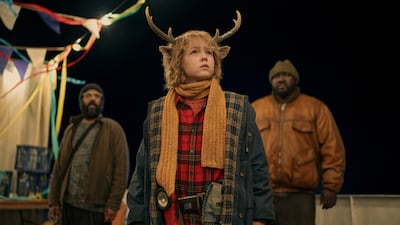I have never been so frustrated by the ending of a show.
The third and final season of Netflix’s Sweet Tooth was released on Friday. As a fan I was excited and curious to see how the writers were going to answer all the questions the show had been teasing us with.
I don’t just mean the simple, pragmatic questions.
Sure, we wanted to know what would happen when protagonist hybrid child Gus (Christian Convery) finally met his mother. We wanted to know the connection between the Sick, the virus that wiped out most of humanity, and the hybrid children. We wanted to know what Dr Aditya Singh (Adeel Akhtar) actually wanted.
These important story threads should be easy and satisfying to resolve. And, to a barely adequate level, the show did so.
But it’s the big questions, the larger themes that Sweet Tooth asks its audience to grapple with, that left us wanting.
Where will human greed take us? What does it mean to be different and can we all coexist despite our differences? What does being part of a family actually mean?
I appreciate that answering existential questions about human existence is a lot to ask from a television show, but I wasn’t looking for answers, I wanted a nuanced, satisfying, exploration of the themes through character, plot and story.
That didn’t happen.
In season one, we were captivated by the tale of a new world full of human children hybrids who were being hunted by scared and desperate humans. It was the story of Gus, a nine-year-old human-deer hybrid, leaving his home in the wilderness to search for his mother and understand where he and all hybrids came from.
In the second season, many of the world’s details were refined while more questions were raised. The characters started to feel more like caricatures of good and bad and the menacing elements of the story were dialled up. The fusion of a quirky fantasy adventure with dark undertones worked in the first season but by the second it was coming off as kitsch.
Season three picks up only a few hours after the events in season two, with Gus and his friends making their way to Alaska to find a mysterious cave that has the answers they’re seeking.

On their tail is this season’s villain, Zhang, played by actress Rosalind Chao. Effortlessly cruel and calculating, she's obsessed with human purity and is on a mission to kill Gus, as she believes that this is the answer to restart human births.
She also has a pregnant daughter and four hybrid wolf grandchildren she has trained to kill.
It gets more complicated when the visions of both Gus and Dr Aditya Singh are added into the mix. And then there is a hybrid man, who is more than 100 years old and contradicts the initial premise that Gus is the original hybrid and that his DNA is special.
Aside from a host of new characters to keep up with, there is also a filler episode about a boat of missing people. Doing little to further the plot, it simply reiterates the central theme, the tragedy of human loss as a result of human greed.
Away from the main storyline, there is a secondary plot focusing on Bear (Stefania LaVie Owen) and her sister Wendy (Naledi Murray), which is action packed but distracts audiences from Gus's journey.

Throughout, I found myself scrolling on my phone during gratuitous fight scenes, getting up to make a snack when characters had prolonged glazed expressions, and rolling my eyes when characters delivered monologues of inauthentic dialogue.
While the first two seasons were well-paced with a gripping plot and were filled with cliffhangers, the final season ups the action and drama in a way that distracts from the plot and tone the story deserves.
This season, the exposition is suffocating to the point that every character interaction sounds like an Oscar's speech. But, fundamentally, the biggest issue with the final season of Sweet Tooth is its balance.
It’s supposed to be a story about the power of stories. But in its rushed effort to make a poignant point about the human condition, it attempts to do too much, sacrificing the storytelling experience and giving us the answers we needed in an ultimately unsatisfying way.


